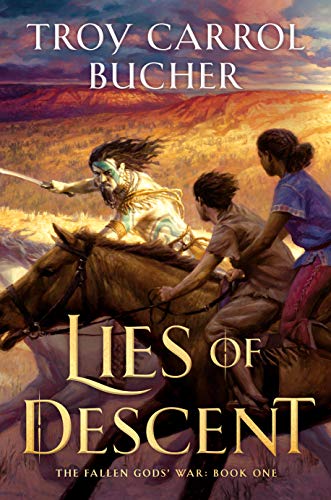
![]() Lies of Descent by Troy Carrol Bucher
Lies of Descent by Troy Carrol Bucher
Troy Carrol Bucher’s Lies of Descent (2019) is the first book in a new trilogy, FALLEN GOD’S WAR, set in a world of magic, fallen gods, clashing cultures, and internal conflict within cultures. While the writing is solid enough, and Bucher offers up a few unexpected turns, the book suffers from overly familiar elements.
Ages ago the gods of light (led by Parron) and darkness (led by Tomu) warred with each other and to prevent that war from wiping out all life, the gods of light sacrificed themselves to drag their foes down with them to mortal lands where their power, though still strong, could not destroy the world. Those mortal descendants with the blood of Parron can wield magic, and the two warring militaristic cultures of the world, the Esharii and Draegorans, both test their youth and then train them (though the Esharii do so only for males).
Lies of Descent opens with 12-year-old Riam being tested by a Draegorian and then collected for training. He’s soon joined by Nola, a young girl who also tested positive, but events intervene before they can reach the island base of the Draegorians, with Nola captured by the Esharii and Riam finding himself sold off into quasi-slavery in a strange city. The other major POV focuses on Ky’lem, close associate to an Esharii warleader whom Ky’lem thinks leads too much with his muscle than his brain. Ky’lem’s desire to see the tribes unified and adapt to a changing world puts him in some conflict with his friend and eventually sees his life intertwine with Nola’s as an Esharri spirit-walker puts into motion his plans to prevent the horrid future he’s foreseen involving the return of Tomu.

Troy Carrol Bucher
The two youngsters come from quite different backgrounds, with Riam living a hard-scrabble farming life with an older brother and a father who regularly beats them both. Being plucked from that life is therefore a relief to him. Nola, on the other hand, is the daughter of two loving parents who have raised her in a comfortable, prosperous and pampered lifestyle, and she therefore spends a lot of her early pages complaining about the shift in her fortunes. This doesn’t do her character any benefits, and it seems even the author is somewhat uninterested as the writing in her sections pales in comparison to Riam’s segments. While Riam gets to help fend off several Esharii attacks, becomes leader of a group of other young candidates, and plots his escape from slavery (as well as take down a villain), Nola mostly gets to stoically deal with being tied up and/or led from place to place. She even spends a chunk of time unconscious. This does eventually change as she comes into her power, but unfortunately not until toward the end of the novel, leaving her feeling eclipsed by both Riam and Ky’lem for most of the story. And there’s a strange aging side-effect of that power that seems a bit too contrived to age her up so other elements don’t feel creepy (though I confess they still did) and that also doesn’t get enough examination within the story for such a huge change.
The story, as noted in the intro, is also more than a bit familiar, with a war between gods, a young person (or two in this case) learning they’re “special” (and then even more special than the other specials) thanks to their blood/background and then getting whisked off from their old life to be trained to use their powers, a patriarchal tribal society, a strictly regimented militaristic organization, an upper-class bully, and so on. Granted, Bucher executes them solidly enough, even tossing a few unexpected turns in there, such as diverting Riam from actually reaching the island, but it still felt overly familiar with little to make it stand out from other novels employing the same tropes. The same is true with the prose style. The world-building is thin; I can’t say I really had a great sense of the land and its societies, but the mythology is intriguing if, again, a bit familiar. On the plus side, Bucher does a quite nice job with physical action, whether in the form of pitched battles, Riam’s slave labor, or arduous journeying.
“Solidly comfortable” is the best description I can go with for Lies of Descent. It goes down a well-trod path and doesn’t really deviate enough (at least in book one) to make it stand out from other similar plots/characters, and its portrayal of female characters (not just Nola) unfortunately bends it in the wrong direction. At this point, therefore, I’d hold off until seeing how book two goes.



That is a startlingly “American YA Western” cover!
I thoroughly enjoyed this book, a great story and looking forward to book 2.